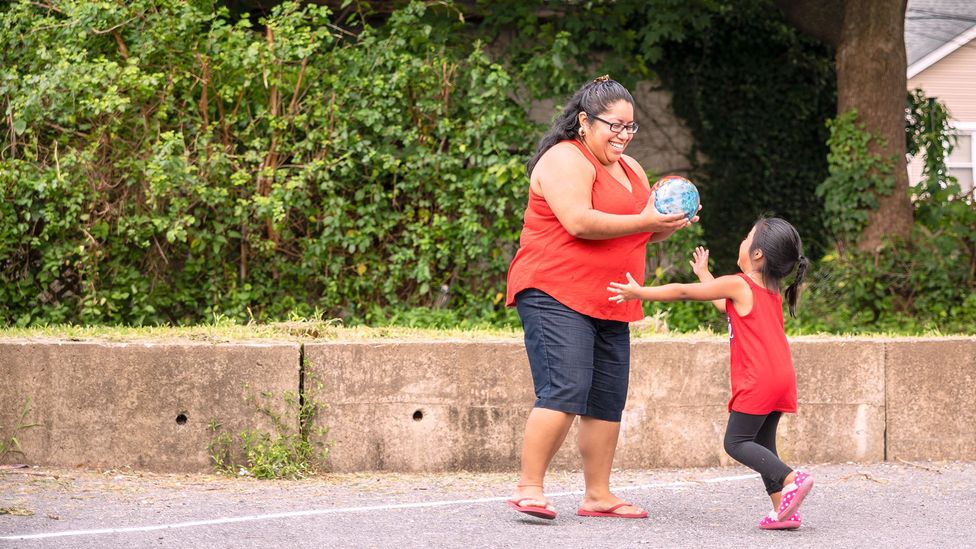When Do Children Learn Language
What is the best historic period to learn a language?

When it comes to learning a foreign linguistic communication, we tend to think that children are the near adept. Only that may not be the case – and at that place are added benefits to starting as an developed.
I
It'due south a decorated autumn morn at the Spanish Nursery, a bilingual nursery school in north London. Parents aid their toddlers out of cycling helmets and jackets. Teachers greet the children with a cuddle and a chirpy "Buenos dias!". In the playground, a little daughter asks for her hair to exist bunched up into a "coleta" (Spanish for 'pigtail'), then rolls a ball and shouts "Catch!" in English.
"At this age, children don't larn a language – they learn it," says the school's director Carmen Rampersad. It seems to sum upwardly the enviable effortlessness of the little polyglots effectually her. For many of the children, Spanish is a third or even fourth language. Mother tongues include Croatian, Hebrew, Korean and Dutch.
Compare this to the struggle of the average adult in a language class, and it would be like shooting fish in a barrel to conclude that it's best to commencement young.
But science offers a much more complex view of how our relationship with languages evolves over a lifetime – and there is much to encourage belatedly beginners.
You lot might as well like:
• Why slumber should be every student'due south priority
• The amazing fertility of the older heed
• Tin can you lose your native linguistic communication?
Broadly speaking, unlike life stages requite united states different advantages in language learning. As babies, nosotros have a better ear for different sounds; as toddlers, we can pick upwardly native accents with astonishing speed. Every bit adults, nosotros have longer attending spans and crucial skills like literacy that allow us to continually expand our vocabulary, fifty-fifty in our own language.
And a wealth of factors beyond ageing – like social circumstances, didactics methods, and even love and friendship – tin bear on how many languages we speak and how well.

Young children are skillful at picking up native accents – but unlike life stages bring different linguistic benefits (Credit: Getty)
"Not everything goes downhill with age," says Antonella Sorace, a professor of developmental linguistics and director of the Bilingualism Matters Centre at the University of Edinburgh.
She gives the example of what is known equally 'explicit learning': studying a linguistic communication in a classroom with a teacher explaining the rules. "Young children are very bad at explicit learning, because they don't have the cognitive control and the attention and memory capabilities," Sorace says. "Adults are much better at that. So that can be something that improves with age."
A study by researchers in Israel found, for instance, that adults were meliorate at grasping an constructed language rule and applying it to new words in a lab setting. The scientists compared iii divide groups: viii-year-olds, 12-yr-olds, and immature adults. The adults scored higher than both younger groups, and the 12-twelvemonth-olds likewise did ameliorate than the younger children.
This chimed with the results of a long-term written report of almost 2,000 Catalan-Spanish bilingual learners of English: the late starters acquired the new language faster than the younger starters.

Some researchers have constitute that immature adults have advantages over children when information technology comes to language learning (Credit: Getty)
The researchers in State of israel suggested that their older participants may have benefited from skills that come up with maturity – like more advanced problem-solving strategies – and greater linguistic feel. In other words, older learners tend to already know quite a lot about themselves and the world and tin can use this cognition to procedure new data.
What young children excel at is learning implicitly: listening to native speakers and imitating them. But this type of learning requires a lot of time with native speakers. In 2016, the Bilingualism Matters Centre prepared an internal report on Standard mandarin lessons in chief schools for the Scottish authorities. They found that 1 hour a week of teaching did non brand a meaningful departure to five-year-olds. Just fifty-fifty just i boosted half-hour, and the presence of a native speaker, helped the children grasp elements of Mandarin that are harder for adults, such as the tones.
Like shooting fish in a barrel acquisition
We all outset out as natural linguists.

Even newborns cry with an emphasis, imitating the speech they heard while in the womb (Credit: Getty)
At that place is no question, Sorace says, that the early years are crucial for acquiring our own language. Studies of abased or isolated children have shown that if we practise not learn human oral communication early on, nosotros cannot hands make upwards for this later.
But here is the surprise: that cut-off is not the aforementioned for foreign language learning.
"The important thing to understand is that age co-varies with many other things," says Danijela Trenkic, a psycholinguist at the University of York. Children's lives are completely different from those of adults. And so when nosotros compare the language skills of children and adults, Trenkic says, "we're non comparing like with like".

When a family moves countries, the children often learn a language faster – but that may exist because it's more necessary to their survival (Credit: Getty)
She gives the example of a family unit moving to a new country. Typically, children will larn the linguistic communication much faster than their parents. But that may exist because they hear it constantly at school, while their parents might exist working lonely. The children may also feel a greater sense of urgency since mastering the language is crucial to their social survival: making friends, beingness accepted, fitting in. Their parents, on the other hand, are more than probable to be able to socialise with people who sympathize them, such as fellow immigrants.
"Creating the emotional bail is what makes you better at linguistic communication learning, in my view," says Trenkic.
Adults tin can of course too create that emotional bail, and non just through dear or friendship with a native speaker. A 2013 written report of British adults in an Italian beginners' grade found that those who stuck with it were helped by bonding with the other students and the teacher.

Language students who create a bond with other speakers are more likely to persevere (Credit: Getty)
"If you find like-minded people, that makes information technology more likely that you'll push button on with a language, and that you'll persevere," Trenkic says. "And that really is the key. You need to spend years learning it. Unless there's a social motivation for it, it'southward actually difficult to sustain."
Earlier this year, a study at MIT based on an online quiz of nearly 670,000 people found that to accomplish native-like knowledge of English grammar, it is best to get-go by about ten years old, afterwards which that ability declines. Notwithstanding, the study besides showed that we tin keep getting amend at languages, including our ain, over time. For example, we only fully principal the grammer of our own language past most xxx. This adds to a previous, split up online report that shows even native speakers learn virtually one new word a day in their own language until middle historic period.

Even native speakers learn almost one new word a day in their own language until centre age (Credit: Getty)
Trenkic points out that the MIT study analysed something extremely specific – the power to laissez passer for a native speaker in terms of grammatical accurateness. To the boilerplate language student, that may not exist all that relevant.
"People sometimes inquire, what is the biggest reward of foreign languages? Will I earn more money? Will I be cleverer? Volition I stay healthier? But really, the biggest advantage of knowing foreign languages is being able to communicate with more than people," she says.
Trenkic herself is originally from Serbia. She simply became fluent in English in her twenties, after she moved to the U.k.. She says she notwithstanding makes grammatical mistakes, especially when she is tired or stressed. "Yet, despite all that – and this is crucial – I can exercise astonishing things in English language," she later writes in an email. "I can enjoy the greatest literary works, I tin produce meaningful and coherent texts of publishable quality."

To the boilerplate language educatee, what past studies have assessed – the ability to pass for a native speaker in terms of grammar – may not be all that relevant (Credit: Getty)
In fact, the MIT quiz classified her as a native English speaker.
At the Castilian Nursery, where the teachers are singing 'Cumpleanos feliz' and the book corner stocks The Gruffalo in Hebrew, the director herself turns out to be a late starter. Carmen Rampersad grew up in Romania and only really mastered English language when she moved abroad in her twenties. Her children absorbed Spanish at nursery.
But perhaps the nearly adventurous linguist is her married man. Originally from Trinidad, he learned Romanaian from her family, who live shut to the border with Moldova.
"His Romanian is fantabulous," she says. "He speaks it with a Moldavian accent. It's hilarious."
Join 800,000+ Time to come fans past liking us on Facebook , or follow us on Twitter .
If you liked this story, sign up for the weekly bbc.com features newsletter , called "If Y'all Only Read 6 Things This Week". A handpicked option of stories from BBC Time to come, Culture, Capital letter, and Travel, delivered to your inbox every Friday.
When Do Children Learn Language,
Source: https://www.bbc.com/future/article/20181024-the-best-age-to-learn-a-foreign-language
Posted by: ashleyhentitivinge.blogspot.com


0 Response to "When Do Children Learn Language"
Post a Comment